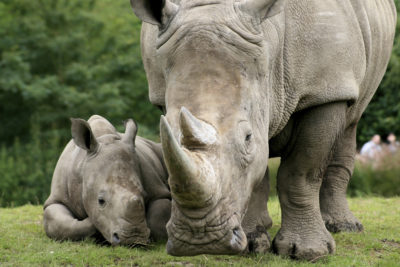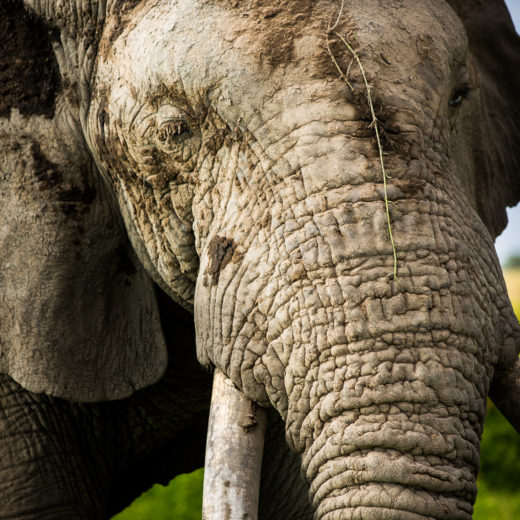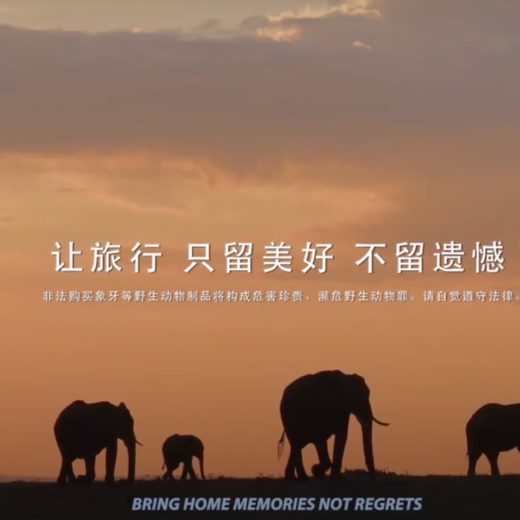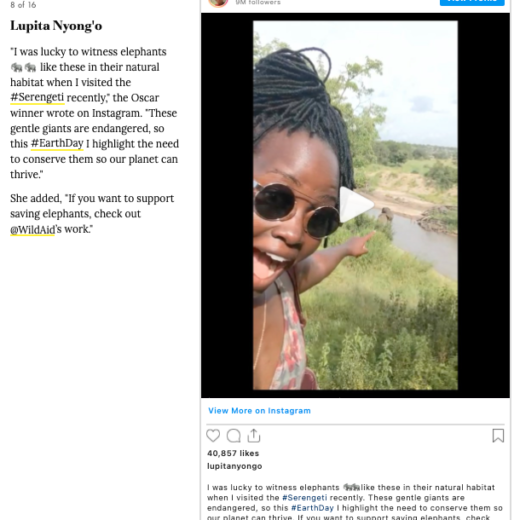
Today, former NBA star and Chinese icon, Yao Ming, launched a major public awareness campaign targeting consumption of ivory and rhino horn in China in partnership with WildAid, Save the Elephants, African Wildlife Foundation, and the Yao Ming Foundation.
In August 2012, Yao spent 12 days on a fact-finding mission in Kenya and South Africa filming a documentary to be aired in partnership with NHNZ later this year. Yao met wild elephants before encountering the bodies of five poached elephants in Kenya and a poached rhino in South Africa. He also visited local school children, whose education is funded through wildlife tourism revenue, and conservationists and government officials working to protect elephants and rhinos. Footage and stills from his trip were released together with a series of public service announcements informing consumers, “When the buying stops, the killing can too.” WildAid thanks Ol Pejeta Conservancy and Virgin Atlantic for their support of Yao’s Africa trip.
Poaching for ivory kills more than 25,000 elephants annually and has reached levels only seen before the 1989 international trade ban. In 2012, 668 rhinos were killed in South Africa alone. These are precipitous increases from just a few years ago and, if not stemmed, could lead to the extinction of African rhinos and elephants in our lifetime.
A survey conducted in November of 2012 in Beijing, Shanghai, and Guangzhou by the Chinese research company, HorizonKey, found that:
More than half of the nearly 1,000 participants (over 50%) do not think elephant poaching is common;
34%, or one in three respondents, believe ivory is obtained from natural elephant mortality;
Only 33% of all participants believe elephants are poached for their tusks; and
94% of residents agree the “Chinese government should impose a ban on the ivory trade
Although the international trade in ivory is banned, a one-off sale in 2008 perpetuated a legal market for ivory in China and Japan. Reports show widespread abuse of the system to launder illegal ivory in China, and seizure and intelligence reports indicate China is the world’s largest market for ivory.
Meanwhile, a similar survey conducted by HorizonKey in the same three major Chinese cities on rhino horn perceptions found that:
66% of all participants, that is two out of every three respondents, are not aware that rhino horn comes from poached rhinos;
Nearly 50% believed rhino horn can be legally purchased from official stores; and
95% of residents agree the “Chinese government should take stricter action to prevent use of rhino horns.”
Traditional Chinese Medicine officially removed rhino horn from the pharmacopeia in China in 1993. These surveys, however, discovered that consumers are now buying rhino horn due to belief in its aphrodisiac properties and fever reducing capabilities. Rhino horn is also being used as a perceived investment and as an ornament or carving.
Despite having only one fifteenth of China’s population, Vietnam is now believed to be an even larger market for rhino horn. Similar public awareness campaigns are planned for Vietnam later in 2013.
The attitudinal ivory and rhino horn surveys highlight the importance of Yao’s involvement in this campaign and the urgent need for him to continue to positively influence his fellow countrymen.
Kenyan researcher David Daballen, of Save the Elephants, stated, “Because of the demand for ivory, poaching has erupted all over Africa leading to the slaughter of tens of thousands of elephants each year. These elephants are not only a part of our world, they are a part of our heritage and our family. We need the Chinese peoples’ help to save our elephants by saying no to ivory.”
Added Dr. Philip Muruthi, Senior Director of conservation science for African Wildlife Foundation, “Rhinos are not threatened by loss of habitat, they are threatened by poaching for their horns for Asian markets. African Wildlife Foundation has been rapidly investing in key target landscapes across Africa to ensure that critical rhino populations are protected, through measures such as aerial surveillance, rapid-response teams, and more and better-equipped boots on the ground.”
WildAid’s Executive Director, Peter Knights, stated, “Elephants and rhinos are conservation flagships, national icons, goodwill ambassadors, and generate hundreds of millions of tourist dollars for African economies funding education and development; they are the pandas of Africa. We have seen illegal markets collapse in the face of strong clear laws, enforcement efforts, and consumer awareness campaigns in the past. By strongly implementing these proven measures, China could become a world leader in wildlife conservation and help save elephants and rhinos.”
Yao’s previous WildAid campaign with shark fin, backed extensively by Chinese media, is credited with a reduction of 50 – 70% in consumption of shark fin in China in 2012 according to shark fin traders, media, and Hong Kong SAR import statistics. Yao’s campaign contributed to a Chinese government decision to remove shark fin soup from all state banquets over the next three years.
Yao stated, ”Poaching threatens livelihoods, education, and development in parts of Africa due to the insecurity it brings and loss of tourism revenue. No one who sees the results firsthand, as I did, would buy ivory or rhino horn. I believe when people in China know what’s happening they will do the right thing and say no to these products.”
Footage, stills, and PSA’s available at info@wildaid.org
Contacts:
WildAid – Peter Knights: +1 415-254-3174, May May Ziwen: +86-1500-110-7500
African Wildlife Foundation – Mayu Mishina: +1 202-939-3324, John Butler: +1 202-361-8344
Save The Elephants – Frank Pope: +254-720-441-178
Stay in touch and get the latest WildAid updates.
SIGN UPAbout WildAid
WildAid is a non-profit organization with a mission to protect wildlife from illegal trade and other imminent threats. While most wildlife conservation groups focus on protecting animals from poaching, WildAid primarily works to reduce global consumption of wildlife products such as elephant ivory, rhino horn and shark fin soup. With an unrivaled portfolio of celebrity ambassadors and a global network of media partners, WildAid leverages more than $308 million in annual pro-bono media support with a simple message: When the Buying Stops, the Killing Can Too.
Journalists on deadline may email communications@wildaid.org


